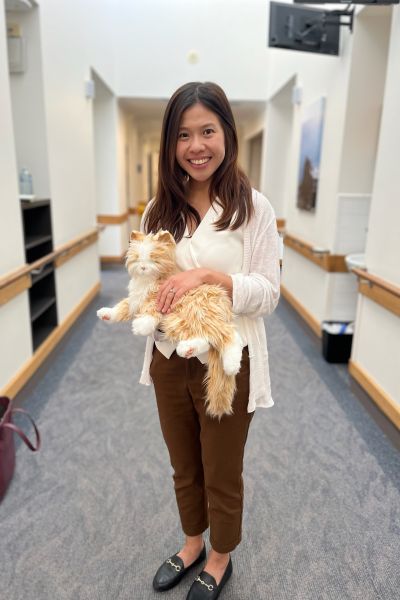Robotic dementia study aims to modernise residential aged care

University of Queensland Robotic Pets for Dementia Study Lead Dr Wei Qi Koh is leading a trial of robotic pets for patients with dementia at Metro North’s Cooinda House in Kippa-Ring.
A targeted study is underway to assess how robotic animals can help with the psychosocial wellbeing of aged care residents living with dementia.

University of Queensland Robotic Pets for Dementia Study Lead Dr Wei Qi Koh is leading a trial of robotic pets for patients with dementia at Metro North’s Cooinda House in Kippa-Ring.
University of Queensland Robotic Pets for Dementia study lead Dr Wei Qi Koh said it was estimated that at least half of the residents living in residential aged care facilities in Australia have dementia.
“Residents with dementia often have reduced opportunities to engage in meaningful activities and interactions, and can tend to feel more isolated and lonelier,” Dr Koh said.
“While interactions with animals can positively impact the wellbeing of people living with dementia, many people in residential facilities often have limited access to pets.
“Research has suggested robotic pets have a potential to improve the wellbeing of people with dementia; however, to be realised, they must be used in care practice.
“More often than not, interventions that are designed for aged care are not often used due to a lack of consideration about their fit with the aged care facility.”
Robotic pets are a technology-based substitute for real animals, and they are designed to resemble and behave like real pets.
“The robots are designed to simulate experiences of interactions with real animals, particularly in situations when using real animals may be logistically or practically challenging,” Dr Koh said.
“The robotic pets, which include cats, dogs and a bird, have light and touch sensors to provide interactive responses, such as meowing and rolling over, barking or chirping.”
The Robotic Pets for Dementia Study was developed in partnership with staff from Cooinda House and with Community and Oral Health Research Director Dr Nicole Gavin.
“This research is focused on developing a sustainable robot pet intervention that supports the psychosocial wellbeing of residents living with dementia,” Dr Koh said.
“A model of care was developed in discussion with staff to understand how pet robots can be integrated into care practice sustainably, considering residents’ needs and staff workloads.”
The study aims to explore how pet robots can be used sustainably in residential care to improve wellbeing in residents with dementia by reducing agitation and improving mood and social interaction of residents.
It also aims to explore their impacts on staff and family members.
“Up to 10 residents and their families will participate in the six-week study, which will see them participate in robot-based interventions up to three times a week,” Dr Koh said.
Specialised aged care nursing director Belinda Sawtell said the robotic study was part of a broader approach at Cooinda House to introduce virtual reality, robotic and cinematic technologies to support resident wellness, social inclusion and memory.
“These technologies are providing opportunities for people with dementia to engage in a range of activities to alleviate stress, promote wellbeing and reduce behavioural symptoms,” Belinda said.
“You see how excited our residents get and how engaged they are with the robots. It brings back strong memories of their own around the interactions they have had with animals in the past.”
Cooinda House, located at Kippa-Ring, is a 60-bed home which provides care for the elderly who require a secure dementia environment and/or specialised residential care for those with an intellectual disability, psychogeriatric, bariatric and/or aged care needs.
